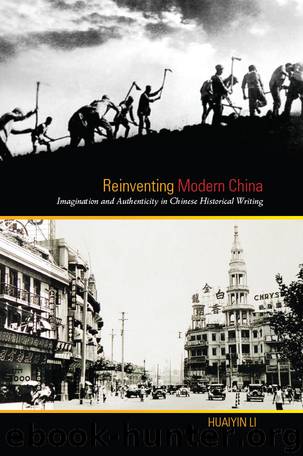Reinventing Modern China: Imagination and Authenticity in Chinese Historical Writing by Huaiyin Li

Author:Huaiyin Li [Li, Huaiyin]
Language: eng
Format: epub
ISBN: 9780824837266
Publisher: University of Hawaii Press
Published: 2012-10-31T00:00:00+00:00
CHAPTER 6
Challenging the Revolutionary Orthodoxy
“New Enlightenment” Historiography in the 1980s
Coinciding with the inception of economic reforms and with “liberating the mind” (jiefang sixiang) in the ideological area, a new intellectual trend, known later as the New Enlightenment (xin qimeng), emerged in the late 1970s and the 1980s. Having witnessed nationwide turmoil or having personally suffered political persecution and physical maltreatment in the previous decade, activists in the movement inquired into the reasons behind the fanaticism and irrationality of the radicals at both the top and grassroots levels. They ascribed the personality cult of Mao, the lack of democracy within the Party, and the disrespect for human dignity during the Cultural Revolution to the fact that China had not fully experienced an intellectual “enlightenment” in its modern era. In their opinion, the advocacy for democracy and science by liberal intellectuals during the May Fourth period in the late 1910s and early 1920s was done only halfway; it soon yielded to the more urgent task of “national salvation” (jiuguo) under the crisis of imperialist invasion, hence allowing for the survival and revival of “feudal remnants” (fengjian canyu) in Chinese politics and Chinese society after the communist revolution, especially during the Cultural Revolution. To eradicate those traditions and prevent a recurrence of the Cultural Revolution, they called for a “make-up class” (buke) of the interrupted and unfinished “enlightenment” in China. Intellectuals in different fields had diverse aims for the New Enlightenment. Scholars in philosophy, literature, and cultural studies discussed enthusiastically the issue of humanism in and beyond the Marxist tradition; they spoke for the “liberty” and “liberation” of man; they embraced scientism, cultural pluralism, and cosmopolitanism, and attacked the conservative attitude found in Confucian traditions. Scholars in political science and law condemned the “excessive concentration of power” in the hands of the top leadership and advocated “division of power” in the government, the establishment of an accountable legal system, freedom of speech, protection of human rights, and the competitive election of People's Congress delegates at the grassroots level (Wang Hui 2003, 155–181, 215–216).
The New Enlightenment movement was more than a break with the Maoist past; it was also a continuation of the liberal tradition that had been interrupted by the Cultural Revolution. As we will find in this chapter, the most active members of the movement were intellectuals who grew up and were educated before the communist revolution. Among them a few were of the post–May Fourth generation, such as the literary theorist Zhou Yang (1908–1989), who played a key role in the debate on alienation and humanism in the early 1980s (Goldman 1994, 119–120), and the writer Ba Jin (1904–2005), who bitterly condemned the Cultural Revolution for its violation of human dignity; but most of the intellectuals of this generation had either died during the Cultural Revolution or, if they survived it, were physically and academically inactive by their last years in the early 1980s. Most of the leading members of the New Enlightenment movement, therefore, were those of the pre-Liberation generation
Download
This site does not store any files on its server. We only index and link to content provided by other sites. Please contact the content providers to delete copyright contents if any and email us, we'll remove relevant links or contents immediately.
The Hating Game by Sally Thorne(17478)
The Universe of Us by Lang Leav(14367)
Sad Girls by Lang Leav(13352)
The Lover by Duras Marguerite(7115)
Smoke & Mirrors by Michael Faudet(5509)
The Rosie Project by Graeme Simsion(5190)
The Shadow Of The Wind by Carlos Ruiz Zafón(4939)
Big Little Lies by Liane Moriarty(4880)
The Poppy War by R. F. Kuang(4432)
Memories by Lang Leav(4171)
What Alice Forgot by Liane Moriarty(3918)
An Echo of Things to Come by James Islington(3840)
From Sand and Ash by Amy Harmon(3679)
The Poetry of Pablo Neruda by Pablo Neruda(3367)
The Tattooist of Auschwitz by Heather Morris(3251)
Guild Hunters Novels 1-4 by Nalini Singh(2933)
Ficciones by Jorge Luis Borges(2860)
THE ONE YOU CANNOT HAVE by Shenoy Preeti(2827)
The Rosie Effect by Graeme Simsion(2708)
